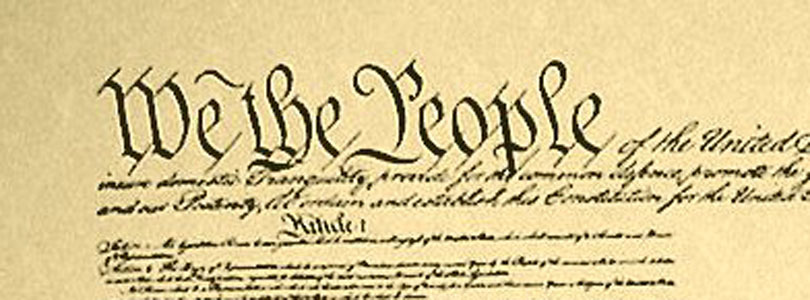To Save Constitutional Liberty, Save Marriage
With advocates’ having finally managed to bring the issue of same-sex marriage to the Supreme Court, it is critical that those who believe in limited government understand one thing: If the Constitution does not allow the people of the United States to maintain the traditional definition of marriage, then it does not allow them to govern themselves.
One often hears the classic quotations of the American Founders, such as “our Constitution was made only for a moral and religious people,” but we can go ol’ John Adams one better: Plainly stated, there is no mechanism for limited government — not federalism, not separation of powers, not representative democracy — that can maintain freedom if the government cannot reflect, but can redefine, the culture of the governed.
Put differently, if the people of the United States cannot insert cultural notions into government that would be wholly inappropriate coming from elected officials, then elected officials will use government to change the culture to their advantage or their own liking. That could be same-sex marriage. It could be some vague “holiday tree” during a school celebration of the solstice. It could be the assumption of Big Gulp evil. Or it could be the elevation of “equity” above Truth and Justice.
An obvious objection is that this is a distinction without a difference, because the people insert things into their government by means of their elected officials. Yes and no. Yes, apart from ballot referenda, an explicitly new concept inserted into law must make its introduction through some sort of official. This is an argument for a broad federalism that pushes substantive decisions as close to the local level as possible, where culture is most palpable and politicians are most accountable.
But on the bigger scale, it’s not true.
To hear some theorists express things, you’d think the government involved itself in marriage only as long ago as President Bill Clinton was disrespecting his own in the Oval Office. The reality is that marriage was a cultural fact long before the United States was a glimmer in Great Britain’s eye.
Through marriage, two people became one entity for social purposes, just as they became one entity for biological purposes in creating children and just as they became one according to most of their religious beliefs. Where the fact of that one entity was relevant to government, the law reflected the culture. That is, elected officials didn’t insert marriage into the law; they built the law around it, with methods of certifying that one existed for the purposes of public policy.
Using the law to redefine “marriage” is what inserts government into the cultural institution. Avoiding that outcome by getting government “out of the marriage business” does the same, because it denies marriage as a real and legally tangible relationship existing within the culture of the governed. Unfortunately for libertarians and moderates, the principles and terminology of social traditionalists are not uniquely vulnerable to this treatment.
Viewed objectively, government has done the heavy lifting to impart a new sense, among younger generations, of what they should and shouldn’t believe about marriage. At the turn of the century, most Americans still thought same-sex marriage to be a bizarre idea. Now, many see it as inevitable. Does anybody truly believe that the progressive, statist project won’t find a new issue on which to flex government’s growing muscle? Here’s a more immediate question: Can anybody think of many more issues solely having to do with the principles that uniquely characterize social conservatives?
In the summer of 2010, MIT Senior Lecturer Otto Scharmer began promoting a concept that he called “Capitalism 3.0.” Free-market libertarians should be concerned to learn that Scharmer didn’t even count their economic principles as 2.0 (that’s European redistribution). Beware, my “fiscally conservative, socially liberal” friends; you’re 1.0 and rapidly becoming economic traditionalists, and stodgy traditionalism is easily dismissed, these days.
Ultimately, even freedom and inherent rights are religious, philosophical, cultural notions around which we have required elected officials to build the laws of the land. If the culture cannot define them into government, then we’ll find the government redefining them for us all.
It may make some branches of the center-right family uncomfortable — social conservatives may be the awkward cousins you’d prefer to usher out the door — but take a look: the statists are backing you out with us. Believe what you like about the clarity of the Founders’ language, but if traditional marriage has no place in the law, then neither does traditional economics or a tradition of liberty.



